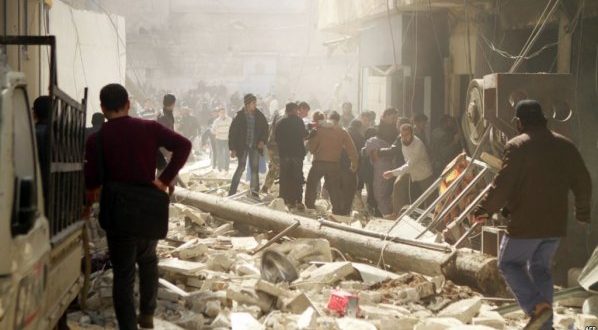Damascus end its second week of thirst and the regime calls factions to withdraw from the headwaters and water pumping stations in order to stop the military operation
The pace of discontent rises in the capital Damascus, the thirst is increased due to the lack of water and the increased demand for it, the regime authorities cut off the water coming from Ein Fijah to the capital Damascus on Friday 23rd of December 2016, claiming that the factions pumped fuel “diesel” through the pipelines that deliver water to the capital, then it turned out that the diesel fuel was leaked into the pipes during the military operations in Ein al-Fijah which destroyed a pump room in the area, then the regime forces stepped up their military operations and targeted towns and villages of Wadi Barada with hundreds of airstrikes, missile and artillery shells, along with violent clashes between the regime forces and militiamen loyal to them from Syrian and non-Syrian nationalities and Hezbollah against the rebel and Islamic Factions and Fath al-Sham Front in areas of Husseiniya, Ain al-Fijah, Bsima and other areas in Wadi Barada.
The Syrian Observatory for Human Rights received information from several reliable sources, which confirmed to the observatory that mediation is taking place between the notables of Barada valley and the Russians, in order for the Russian to enter a delegation to repair the pumps in Ain al-Fijah, and re-pump the water to the reservoirs of the capital, also reliable sources informed the Syrian Observatory that the regime forces demanded the fighters to get out of the of the water pumping stations in Ain al-Fijah and water spring area and the town of Bsima, in exchange of stopping the military operation in Wadi Barada, which on Thursday entered its 17th day in a row, and that -in case the fighters accept that- the areas of which the fighter will get out of will be under the control of the regime or under the responsibility of civilian authorities loyal to the regime and close to it, also reliable sources confirmed to the Syrian observatory that Hezbollah seeks “full and comprehensive settlement” in Wadi Barada area through reaching an agreement of “reconciliation and situation settlement”, or the fighters’ exit completely and with their weapons to Idlib Province north of Syria.
And as a result of the continued cutting off water of the capital, the prices of mineral water and the water sold in the capital insanely rose, the citizens depend on the water of wells that were drilled in streets and parks, in addition to wells in pools at the capital, while the regime authorities organize pumping water from other sources to neighborhoods and suburbs in the capital Damascus, by organizing tables that determine the time of water pumping to each area, as well as distributing water through water tankers, while some people in the capital rely on the mineral water that traders exploit the people’s urgent need of it, and raise the prices doubles.

